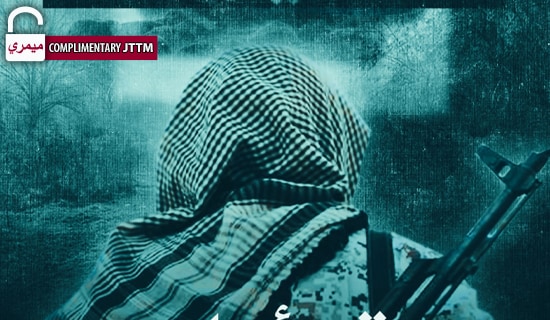The following report is now a complimentary offering from MEMRI's Jihad and Terrorism Threat Monitor (JTTM). For JTTM subscription information, click here.
The Tehreek-e-Taliban Pakistan (TTP) has released Issue 45 of its Urdu-language PDF bulletin "Manzil," in which the TTP spokesman calls on the people of Pakistan to support the jihadi group in its fight against the Pakistan military.
Issue 45 is dated Rabi-ul-Awwal 1, 1446, in the Hijri calendar, which corresponds with September 4, 2024. The bulletin is published every 10 days.

The masthead of the TTP's Urdu bulletin Manzil
Most of the contents in the single-page bulletin consist of the statements and claims issued by TTP spokesman Muhammad Khurasani over the preceding 10 days.
A brief report in the bulletin mentions that the Cairo talks have failed to yield results regarding the withdrawal of Israeli forces from Gaza. According to the report, neither Hamas nor Israel agreed on the points presented by the mediators, and a 13-member Israeli negotiation team left.
Another item titled "Getting Training For Jihad Is The Duty Of Every Muslim" highlights the importance of receiving military training, saying: "Obtaining training for jihad is compulsory for all Muslims, and no parent or guardian is permitted by Islamic law to prevent the fulfillment of such an obligation." It says that abandoning such obligations brings the wrath of Allah.
The bulletin also features a leading report on the attacks executed by the TTP fighters in August 2024. According to TTP's monthly report for that month, its fighters executed 243 attacks across various regions of Pakistan, primarily targeting tribal districts in Khyber Pakhtunkhwa province. These attacks killed 202 Pakistani security personnel and wounded 245 others.
The report says that the casualties included 272 members of the Special Services Group (SSG), 86 police and Counter-Terrorism Department (CTD) officers, 86 soldiers from the paramilitary Frontier Corps, and six personnel from intelligence agencies and peace committees.

TTP spokesman Muhammad Khurasani urges Pakistanis to fight the Pakistani military.
The TTP bulletin features a two-column special report on the kidnapping and release of Pakistan Army officer Lt.-Col. Khalid, along with his brothers and other relatives. The report says that Lt.-Col. Khalid and the other officers were abducted by the TTP special squads and later freed them as part of a deal mediated by local elders.
Contrary to the statement issued by the Inter-Services Public Relations (ISPR), the media wing of the Pakistan military which claimed that the officers were released unconditionally, the TTP asserts in the report that their release was indeed part of a negotiated deal about which no further details were given.
The Pakistan Army officer, along with his two brothers and a nephew, was abducted by the TTP fighters during a condolence ceremony for their late father at a mosque in Kulachi Township, Dera Ismail Khan district, Khyber Pakhtunkhwa, on August 29. The abductees were then taken to an undisclosed location. TTP released a video showing the two brothers.

The bulletin lists TTP publications, podcasts, and videos
The bulletin also includes a list of TTP media content such as videos, audios, newspapers, magazines, and podcasts. According to the list, TTP has 14 video series. Below are the names and details of these series:
"Abtaal-e-Ummat," which features biographies of deceased TTP leaders;
"Rasm-e-Mohabat," which highlights the biographies of both slain TTP leaders and mujahideen.
"Ab Nahi to Kab Nahi," which focuses on alleged atrocities committed by Pakistani security forces;
"Tayyar Hain Hum," which showcases TTP fighters undergoing military training and replaced "Al-Madoon Lil Qitaal";
"Markay Hain Tez Tar," which depicts TTP fighters in combat operations and which replaced the previous series known as "Al-Kararoon";
"Mein Jihad Ka Musafir," which chronicles the journeys, religious practices, and daily lives of TTP mujahideen;
"Daawat-e-Jihad," which features speeches delivered by TTP ulema (religious scholars);
"Shaheen Jawan," which details Ishtishhadi ("martyrdom-seeking") operations and features videos of suicide bombers;
"Zair-e-Nazar," which exposes alleged corruption within the Pakistani government, parliamentary and judicial systems, alongside supposed atrocities against the public;
"Bashari lil Usra," which showcases the release of TTP mujahideen;
"Kafalatul Yateem," which features aid distribution to the orphans of TTP fighters;
"Hum Log Hain Taliban," which introduces TTP mujahideen, outlining their roles and responsibilities within the organization;
"Rabt-e-Millat," which is a podcast series featuring interviews with TTP leaders on current affairs;
"Ye Teray Pur Israr Banday," which highlights TTP operations, sometimes on the same day or shortly after;
"Morning Broadcasts," which focuses on Dars-e-Hadith (teaching traditions of Muhammad), Fiqh (Islamic jurisprudence), and the life of the Prophet Muhammad;
"Evening Broadcasts," which includes Dars-e-Quran, the life of the Prophet Muhammad, Taleemul Jihad (teaching of jihad), reports on Muaskar al-Farooq operations, interviews, poems, and jihadi recollections;
"Taliban," which is a general magazine featuring articles on the country's situation, religious topics, and jihad;
"Binaat Khadijat-ul-Kubra," which is a special magazine for women;
"Sada-e-Taliban," which is a Pashtu-language magazine of Tehreek-e-Taliban Pakistan;
"Taliban" Special Issue, which focuses on specific issues of importance;
"Manzil," which is a bulletin every 10 days covering reports on TTP operations over the previous period;
"Pasoon," which is a series of audio podcasts released two to three times per month featuring interviews with TTP officials and operational reports.
The full text of this post is available to subscribers.
Please login or register to request subscription information from MEMRI









